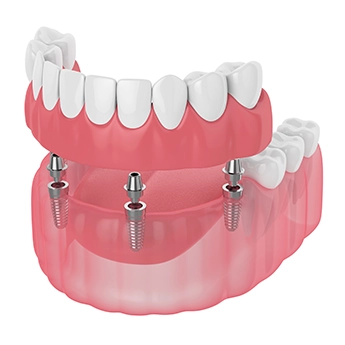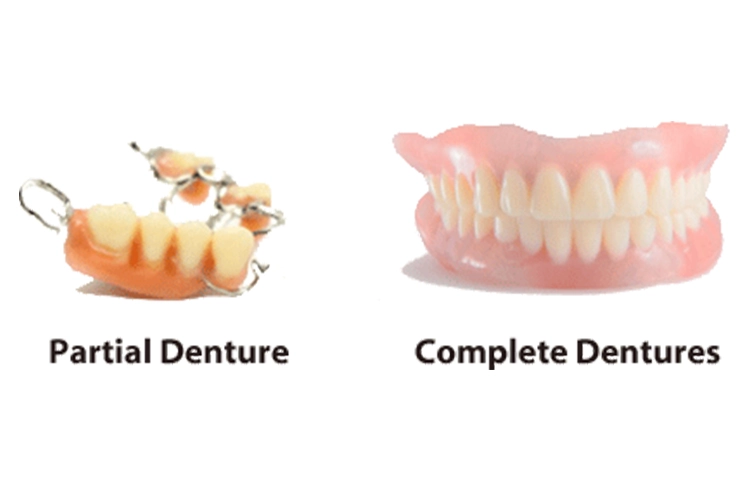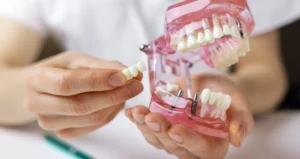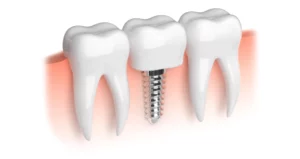Tooth loss can be caused by genetics, habits, and more. Losing your natural teeth can be challenging, but thanks to advancements in the dental world, there are several options for restoring your smile.
One of the most common choices at Tamarack Hills Family Dentistry is false teeth. In this article, we’ll explore the world of false teeth including cost considerations, types, alternatives, and maintenance. If you are considering it , you must understand the options and care required.
Types of False Teeth
There are three primary types of false teeth:
Partial Dentures
Partial dentures are recommended when only a few teeth are missing. They can be removable or fixed, and various materials, such as acrylic or metal, may be used.
Complete Dentures
Complete dentures are for individuals who have lost all their natural teeth. They can be conventional or immediate, with the former placed after the gums have healed, and the latter inserted immediately after tooth extraction.
Implant-Supported Dentures
Implant-supported dentures can be partial or complete and are secured in place by dental implants. The implants provide increased stability and prevent issues such as slipping/sliding and discomfort.
Signs and Reasons for False Teeth
While permanent teeth can last a lifetime with proper care and maintenance, tooth loss is a common problem. Tooth loss is often caused by genetic conditions, tooth decay, gum disease, and injury. Missing teeth can lead to difficulties eating and speaking, which can ultimately impact self-confidence. This is why false teeth are such a popular option.

The Process of Getting False Teeth
The journey to obtaining false teeth involves a comprehensive dental exam, impressions, and measurements. Depending on the type of false teeth chosen, you may need to have tooth extractions, bone grafting, or implant surgery. You will need to stick to a soft food diet for several days to several weeks during the healing process. Follow-up appointments are critical for adjustments to ensure comfort and functionality.
Alternatives to Dentures
There are a couple of alternatives to traditional false teeth:
Dental Implants
Dental implants are a popular alternative to dentures, offering a more permanent solution. Implants are surgically placed in the jawbone, providing a stable foundation for replacement teeth.
Dental Bridges
Bridges use adjacent teeth as support for a false tooth or teeth, bridging the gap created by missing teeth.
Cost Considerations and Insurance
The cost depends on several factors including:
- Type of dentures
- Materials used
- Complexity of the procedure
Dental insurance may cover a portion of the expenses. Our office staff will work with your provider to determine your coverage. If your insurance does not cover anything or if your portion is still out of your budget, we offer financing options to help make it more affordable
Care and Maintenance
Proper care and maintenance are critical for the longevity of false teeth. A regular care routine should include:
Cleaning
Cleaning will remove plaque, bacteria, and stains from your dentures. This includes:
- Brushing with a soft-bristled brush designed for false teeth
- Soaking in a denture cleaning solution or equal parts white vinegar and water
Always use lukewarm water for cleaning, as hot water can warp/damage dentures.
Handle With Care
When handling your dentures, place a towel or basin of water to create a soft surface in case you drop them. If you do drop them, make sure to inspect them carefully for damage- even if they do fall on a soft surface- and, if necessary, contact your dentist.
Proper Oral Hygiene
Proper oral hygiene is critical for your gums, tongue, and any remaining natural teeth. In addition, make sure to visit the dentist regularly for check-ups and cleaning.
Dietary Considerations
Certain foods and habits can impact the condition of your false teeth. Therefore, it’s important to avoid sticky or hard foods and limit foods that are known to stain. Always rinse dentures thoroughly after consuming staining foods and clean them thoroughly as soon as possible.
Nighttime Care
Remove your dentures at night to give your mouth a break. Store them in water or a denture solution to prevent them from drying out and becoming warped.
Regular Dental Visits
According to the American Dental Association, you should visit the dentist at least every 6 months to monitor the condition of your false teeth and address any issues.
False teeth are a practical solution for those who are dealing with tooth loss. However, understanding the various options, the most common reasons for needing them, and the maintenance required is critical for making informed decisions. Consulting with a dentist can provide you with personalized advice based on your personal needs, preferences, and expectations.
Schedule Your False Teeth Consultation Today
Your oral health is critical for your overall health and well-being. Thanks to modern dentistry, you have plenty of options to improve your smile.
If you are missing teeth and want to learn more about your options, schedule your consultation with Dr. Avi Matha and the team at Tamarack Hills Family Dentistry. He will take the time to get to know you and your unique situation to help you decide which option is best for you.
False Teeth FAQs
The dental professionals at Tamarack Hills Family Dentistry understand that you want to know more about your options before making a decision. Therefore, we will be happy to address any of your questions or concerns. Below are a few of the most common ones that we’ve gotten:
What are the best false teeth to have?
The “best” false teeth depend on your personal needs, preferences, and budget. Your dentist can help you compare your options and make your decision.
How long do false teeth last?
The lifespan of false teeth varies depending on the type. On average, traditional false teeth last an average of about 5 to 10 years. Dental implants can last a lifetime with proper care and maintenance.
Are false teeth better than implants?
Both tooth replacement options have their advantages. Traditional false teeth are removable and usually more affordable. On the other hand, dental implants are a more permanent and stable solution.
What fake teeth last the longest?
Research shows that implant-supported dentures tend to last the longest thanks to the increased stability and durability.



